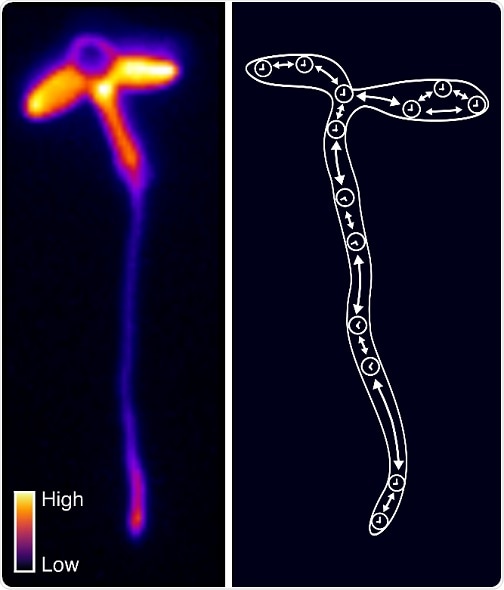From cyanobacteria to humans, nearly all living things on Earth have an internal circadian clock that regulates their activities on a 24-hour cycle. For mammals, there is a master clock located in the brain that controls peripheral clocks elsewhere in the body; plants also have multiple clocks, but it has been unclear whether they have a brain-like master that coordinates them.

Plants containing a reporter gene for the circadian clock (left) reveal that plant clocks are set to different times across the plant, but coordinate their timing through cell-cell signaling (right). Credit: James Locke
New research publishing August 15 in the open-access journal PLOS Biology, led by James Locke’s team in the Sainsbury Laboratory at the University of Cambridge in collaboration with the University of Liverpool and the Earlham Institute, shows that clocks in plant seedlings can self-organize without a master, collecting external signals such as light and temperature, and then communicating this information with their neighbors.
By analyzing all the major organs together, we can see how their different clocks interact, helping us to understand how plants coordinate their timing. We found that in thale cress (Arabidopsis thaliana) seedlings, the clock runs at different speeds in each organ with as much as four hours’ difference in period between the fastest and slowest clocks.”
Mark Greenwood, lead author
While the individual clocks in organs have different speeds (periods), the research team discovered that this didn’t result in chaos. “Although the clocks’ speed is set locally by their organ-specific inputs such as light, they are also talking to their neighbors to locally coordinate themselves. This combination of period differences between organs and local cell-to-cell signals produces spatial waves of clock gene activity. This means that plant clocks are set locally, but coordinated globally via spatial waves,” Greenwood says.
Research group leader, Dr Locke says understanding how plant circadian clocks work may help to improve crop productivity.
Plant circadian clocks help to time many processes that are important for agriculture, including growth, flowering, and resistance to disease. Understanding how the clock is coordinated should in the future allow us to manipulate how plants anticipate daily events in order to boost crop yield."
Source:
Journal reference:
Greenwood, M. et al. (2019) ) Coordinated circadian timing through the integration of local inputs in Arabidopsis thaliana. PLOS Biology. doi.org/10.1371/journal.pbio.3000407.